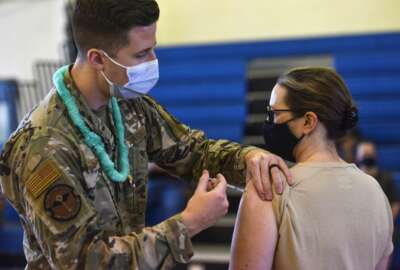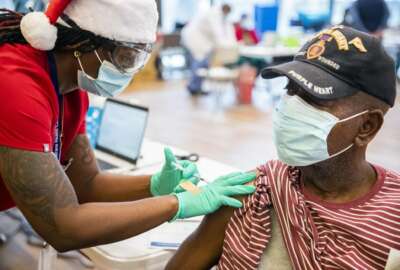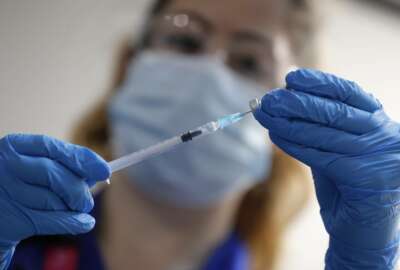
Lawmakers alarmed by high COVID-19 vaccine refusal rate at BOP workforce
Fewer than half of employees at the Federal Bureau of Prisons have accepted the COVID-19 vaccine, even though all of them have been offered it.
The Federal Bureau of Prisons has extended the COVID-19 vaccine to every employee, but just 49% of the workforce has accepted the offer, agency leadership told Congress last week.
“We certainly are continuing to encourage it and offer it,” Michael Carvajal, BOP’s director, said last week during a hearing on the agency’s pandemic response before the House Appropriations Commerce, Justice and Science Subcommittee. “If someone changes their mind or wasn’t available, they can tell us if they want it and we’ll make arrangements to make sure they get it.”
Members of Congress, however, were shocked more than half of the workforce had refused the vaccine.
“Why do you think it is that less than half have opted to be vaccinated when it’s been offered to 100%? Does that strike you as odd?” said Rep. Charlie Crist (D-Fla.).
“I wish I could answer that, but I certainly can’t force it on anyone,” Carvajal said. “I am vaccinated and I encourage all of my staff to get it. That’s the best I can do.”
BOP can’t make the vaccine a requirement of employment, because the Food and Drug Administration hasn’t formally approved any of the COVID-19 vaccines beyond providing emergency use authorization.
“Obviously we have a collective bargaining agreement, so at that point should we ever make that decision once they’re authorized I still have [to] negotiate that process appropriately and respect people’s rights because it will become a condition of employment and if someone refused the vaccine, they potentially may not have a job,” Carvajal said. It’s a little more of a process.”
The Department of Veterans Affairs said it too wouldn’t compel employees to take a COVID-19 vaccine for the same reason, but employees of the Veterans Health Administration are accepting the shot at far greater rates.
More than 72% of the VHA workforce had received the vaccine last month, and those numbers have only gone up in recent weeks. According to VA’s public data source, 252,769 VHA employees are fully vaccinated to date.
“I don’t fully understand it myself,” Carvajal said, when pressed again on how BOP was handling vaccinations. “I get guidance and counsel from people. Between my medical personnel, my legal personnel and … the human resource side, we have had extensive conversations. I assure you if I could compel it, just for the sake of, to me, common sense, I would do it. I do have to follow the rules.”
BOP can’t compel its inmates to take the vaccine either, Carvajal said. The agency offers the vaccine to employees first, and if they refuse, has asked inmates if they’re interested as well.
Today, 25% of BOP’s inmate population of 151,000 has received at least one vaccine dose, the agency said. BOP so far has administered about 80,000 doses of the COVID-19 vaccine.
Carvajal said all inmates will have had the opportunity to receive the vaccine by July.
“It seems to me there has to be a way to change that number, because if the guards aren’t being protected the inmates aren’t being protected,” said Rep. Dutch Ruppersberger (D-Md.).
Lawmakers repeatedly asked Carvajal about vaccine refusal within the BOP workforce.
“The fact that one-half of the officers are declining to take a vaccination that is available to them in this situation is unexplainable,” said Rep. Ed Case (D-Hawaii). “I don’t know how to explain that. You have almost 40% of the inmates have now been infected in one way, shape or form by COVID, if I understand your statistics correctly. Something is wrong if one-half of the officers that can take it, don’t. I don’t know whether that’s a lack of information or misunderstanding within the officer force, but it is a public health matter that that many declined to take it.”
The agency has also spoken to BOP’s union about encouraging frontline employees to take the COVID-19 vaccine, Carvajal said.
A few members of Congress suggested the Justice Department or even the president would need to get involved to make COVID-19 vaccines mandatory.
“That seems like it would either come out of the legislative branch or an executive order of some sort,” said Rep. Mike Garcia (R-Calif). “I don’t support mandatory vaccines as a qualification to work in any capacity, but I also think it’s rational that if that path is taken it should be directed from the federal government and not up to individual directors within federal agencies.”
Copyright © 2024 Federal News Network. All rights reserved. This website is not intended for users located within the European Economic Area.
Nicole Ogrysko is a reporter for Federal News Network focusing on the federal workforce and federal pay and benefits.
Follow @nogryskoWFED
Related Stories

Senators seek bigger role, more doses for VA in vaccine distribution efforts




